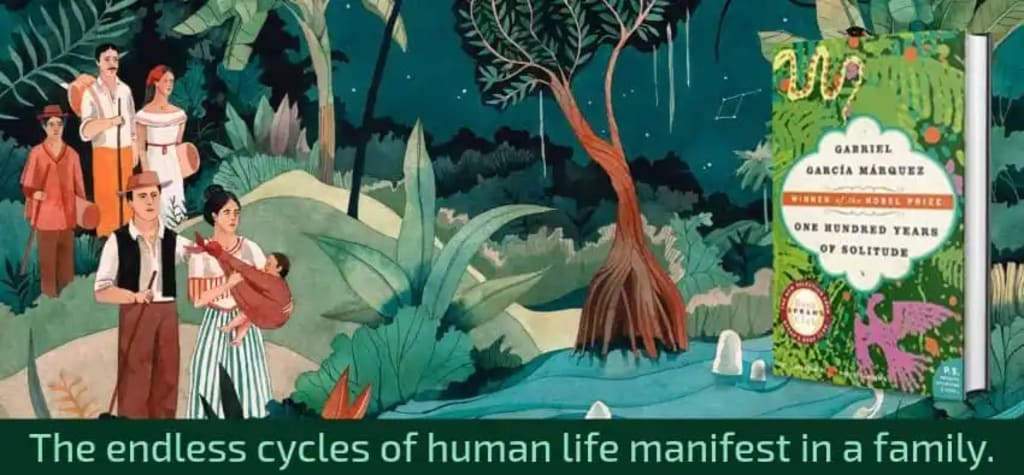One Hundred Years of Solitude
English

Title: One Hundred Years of Solitude: A Masterpiece of Magical Realism and Human Existence
Introduction:
"One Hundred Years of Solitude" by Gabriel García Márquez stands as a literary tour de force, captivating readers with its rich storytelling, intricate plot, and profound exploration of human existence. Published in 1967, the novel weaves a tapestry of multiple generations of the Buendía family, offering a compelling blend of magical realism, historical context, and universal themes. Let us embark on a journey through the mystical town of Macondo and delve into the timeless allure of "One Hundred Years of Solitude."
The Plot:
The novel unfolds in the fictional town of Macondo, founded by José Arcadio Buendía and Úrsula Iguarán. As the story progresses, the Buendía family becomes entwined in a cyclical pattern of love, war, and tragedy. Márquez masterfully constructs a narrative that spans seven generations, presenting a vast array of characters and exploring the complexities of their lives.
The magical realism that permeates the novel adds an ethereal dimension to the story. Márquez blends the fantastical with the everyday, blurring the lines between reality and myth. Supernatural elements such as levitation, alchemy, and prophetic dreams coexist seamlessly with historical events, creating a world that is both familiar and otherworldly.
Themes of Time, Fate, and Solitude:
"One Hundred Years of Solitude" delves into profound themes that resonate with readers across cultures and generations. One of the central themes is the passage of time and the cyclical nature of human existence. As the narrative unfolds, events and patterns repeat themselves, highlighting the inevitability of history's repetition and the futility of trying to escape one's fate.
Solitude, both literal and metaphorical, is another significant theme explored throughout the novel. Characters experience isolation, longing, and a deep sense of melancholy, even amidst the bustling activity of Macondo. Márquez portrays the human condition as one filled with longing, where even amidst love and connection, an underlying sense of solitude prevails.
Critique of Historical and Political Context:
Márquez skillfully embeds the novel within a broader historical and political context. Through the Buendía family's experiences, he addresses the turbulent history of Latin America, including colonialism, civil war, and the effects of modernization. The novel acts as a critique of the oppressive systems and societal transformations that have shaped the region.
Characters such as Colonel Aureliano Buendía, who represents the cycle of revolution and violence, and Remedios the Beauty, who embodies innocence and purity, serve as allegorical figures reflecting the broader social and political climate. Márquez's portrayal of the fictional town of Macondo serves as a microcosm of Latin America, capturing its struggles, triumphs, and collective memory.
Literary Significance and Legacy:
"One Hundred Years of Solitude" holds a prominent place in the literary canon, heralded for its groundbreaking style and narrative innovation. Márquez's use of magical realism, blending the ordinary and the extraordinary, has had a profound influence on literature and has inspired countless authors worldwide.
The novel's exploration of themes such as love, time, and solitude transcends cultural boundaries, resonating with readers on a universal level. Márquez's poetic prose and vivid imagery breathe life into his characters and transport readers to the enchanting world of Macondo.
Conclusion:
"One Hundred Years of Solitude" is a testament to Gabriel García Márquez's literary genius, offering a mesmerizing exploration of human existence, the complexities of history, and the enduring power of storytelling. The novel's blending of magical realism with historical context creates a compelling narrative that continues to captivate readers, cementing its status as a timeless masterpiece of world literature.





Comments
There are no comments for this story
Be the first to respond and start the conversation.